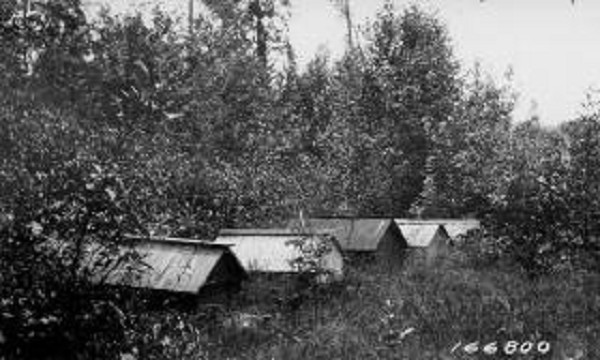 Covered Indian graves were photographed in 1922 by the U.S. Department of Agriculture.
Covered Indian graves were photographed in 1922 by the U.S. Department of Agriculture.
CHIPPEWA RITES: Human Remains Found in Saginaw Repatriated
May 11, 2014
By: Dave Rogers
The Saginaw Chippewa Indian Tribe of Michigan recently conducted a "Re-commitment to the Earth Ceremony" in the Tribe's Nibokaan Ancestral Cemetery.
Human remains of three individuals found in Saginaw County during road construction and the ancestral human remains of one (1) Native American individual and 762 associated funerary objects from the University of Massachusetts Amherst in Amherst, Massachusetts, found in Ohio, were repatriated.
The cemetery was established in 1995 for the explicit purpose of reburying repatriated Native American ancestral human remains and associated funerary objects. The Nibokaan Cemetery is located on the Saginaw Chippewa's Isabella Indian Reservation, behind the Tribal Campground located at 7525 East Tomah Rd., Mt. Pleasant.
A Journey Feast to conclude the ancestral ceremonies and protocols was held at the Ziibiwing Center of Anishinabe Culture & Lifeways, 6650 East Broadway, Mt. Pleasant.
The remains were collected during road construction in Saginaw County by a private citizen and stored in a garage. The private citizen's daughter reported that her father collected the remains when she was a little girl. No known individuals were identified. No associated funerary objects were present.
The Michigan State University Anthropology Lab determined through investigative, forensic means that the remains are "Pre-modern Native American,' and represent one adult and at least two juveniles.
The location the remains were found were described only as "near the current location of the Saginaw Chippewa Indian Tribe of Michigan." No additional lineal descendants or representatives of any Indian Tribe or Native Hawaiian organization came forward to request transfer of control.
Shannon Martin, a member of the delegation and director of the Ziibiwing Center of Anishinabe Culture and Lifeways for the Saginaw Chippewa Indian Tribe of Michigan, told National Public Radio:
"Our grandmothers and grandfathers who were excavated or who were looted generations and generations ago, we're finally able to bring them home from the various institutions back for a reburial."
She said, "It's a healing ceremony. It's an appeasement ceremony to be able to rebury our ancestors in a reverential way, say the prayers and sing the songs that will reconcile the wrong that was done to them when they were taken from the earth."
Martin said that the commitment of remains to the earth is an important part of the Tribe's traditions. "When we place our bodies into the earth, we're paying respect to our mother and everything she did for us during our lifetime. So for every drop of water we drank or every animal or plant that we ate or used for medicines, our body is that final gift and when that's disturbed, it's a direct violation of our spiritual protocol."
A 1990 federal law, the Native American Graves Protection and Repatriation Act, requires museums and federal agencies to document Native American human remains and cultural artifacts in their collections and consult with federally recognized Native American tribes regarding their return to descendants or tribes.

